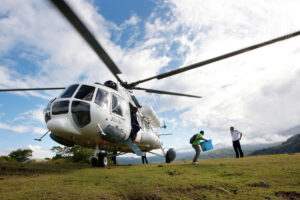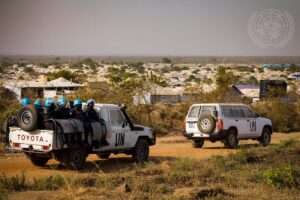From January 12-15 the Powering Peace team, including both Stimson and Energy Peace Partners, traveled to Abu Dhabi in the United Arab Emirates (UAE) to share our research with key stakeholders and start mapping out an implementation plan to include the private sector in developing renewable energy projects in the five countries that host the largest United Nations (UN) peace operations: Mali, Central African Republic, Democratic Republic of Congo, South Sudan and Somalia. The main draw was the Annual Ministerial Assembly of the International Renewable Energy Agency (IRENA), which brought together (in-person for the first time in three years) representatives from a number of governments, international agencies, private sector and nongovernmental organizations. The weather was dry with outdoor temperatures in the 70s, chilly for the normally scorching UAE but not so much to discourage some beachgoers.
High-Level Event
Our primary focus was a High-Level meeting hosted by the UN and IRENA on the Energy Compact on Renewable for UN Peacekeeping, moderated by Stimson Senior Fellow Tori Holt. The two-hour session brought together leadership from the UN missions and host governments, and explored the opportunities for communities that host UN peace operations to benefit from the UN’s transition to renewable energy, especially in rural and remote settings. Another result was the examination of potential project concepts and the development of a high-level work plan to guide project implementation. While sessions like this can be so highly scripted as to drain the energy from the room, the presentations and subsequent discussion crackled with enthusiasm as participants realized the full range of stakeholders and recognized how momentum in climate finance and declining costs for renewable energy could be harnessed to drive real change in fragile and vulnerable settings.

The day after the High-Level event, the Powering Peace team joined meetings with the UN (representatives from headquarters and some of the peacekeeping missions) and IRENA to present our research findings and recommendations for implementing meaningful and sustained renewable energy transitions at scale in locations that host UN peace operations. These meetings marked one of the first times that host governments have had a chance to engage with a wider range of international enablers on this topic, and it appeared to be a game changer for them in terms of assessing how to turn theory and good intentions into actual practice. There is limited progress in developing energy projects in all five countries, and the opportunity to unlock UN peacekeeping missions as anchor clients to catalyze new projects represents a sea change in financial calculations.
Edge Discussions
Of course, no international conference at a luxury hotel in a desert kingdom would be complete without a rich range of individual meetings on the sidelines. Our indefatigable team set up some meetings and joined others on the spot to learn more about what steps throughout the year would be needed to build on the evident momentum everyone felt.
A representative from the UAE, which has been a stalwart partner in our work for the past several years, urged us to present our next-step plan on the margins of COP-28 in neighboring Dubai in November. Several other national representatives echoed a key research conclusion of ours: Transitioning UN peacekeeping missions to renewable energy at scale was the only way the UN Secretariat could meet its own climate goals of 80% renewable energy usage by 2030.
A venture capitalist and consummate dealmaker felt gaining support for renewable energy projects from impacted communities surrounding UN peacekeeping missions would help ensure their sustainability and gave us some valuable insights into how to couple philanthropic funding with patient private-sector investment.
Stimson and the Powering Peace team were praised by many participants for helping guide the discussion and leveraging our research in this area toward concrete policy outcomes.

The Opportunity
Increased use of renewable energy in fragile states faces a host of challenges, but also can unlock a series of opportunities. Tenuous and vulnerable diesel fuel supply chains are often controlled by malign actors in conflict settings and are targets for corrupt officials, potentially leading to intensified and increased violence. Decentralized renewable energy projects that provide new electrification in vulnerable communities can be a basis for economic development and stability.
Acting as an anchor customer and often the country’s largest energy consumer, UN peacekeeping missions can help jump-start investment in, and development of increased energy access for the greatest impact. Moreover, the vulnerability of these countries to conflict is compounded by their direct and harmful exposure to climate change impacts. An increased investment in renewable energy offers a climate-friendly path to supporting a range of energy access, development, and peacebuilding goals.
Besides validating the unquantifiable value of post-pandemic in-person contact, we left Abu Dhabi excited by our common goals and by the very real prospects of assembling a new coalition to support renewable energy generation in some of the places it is needed most.




